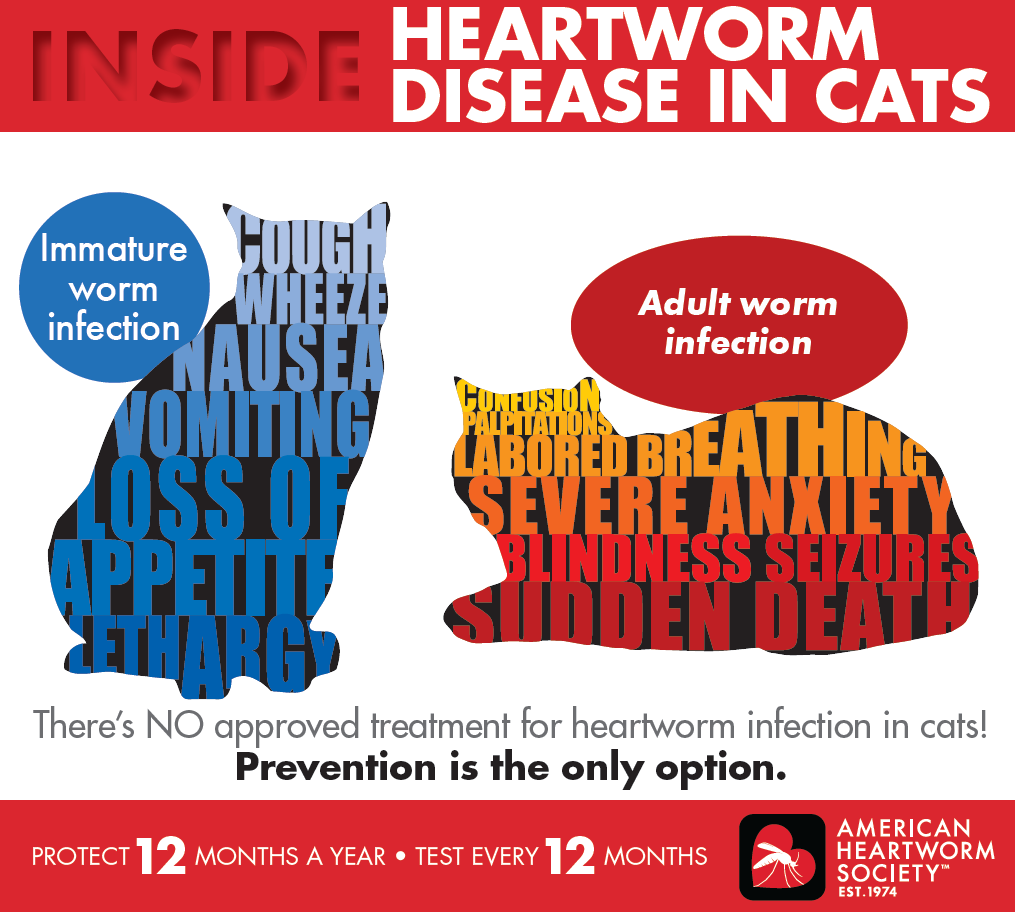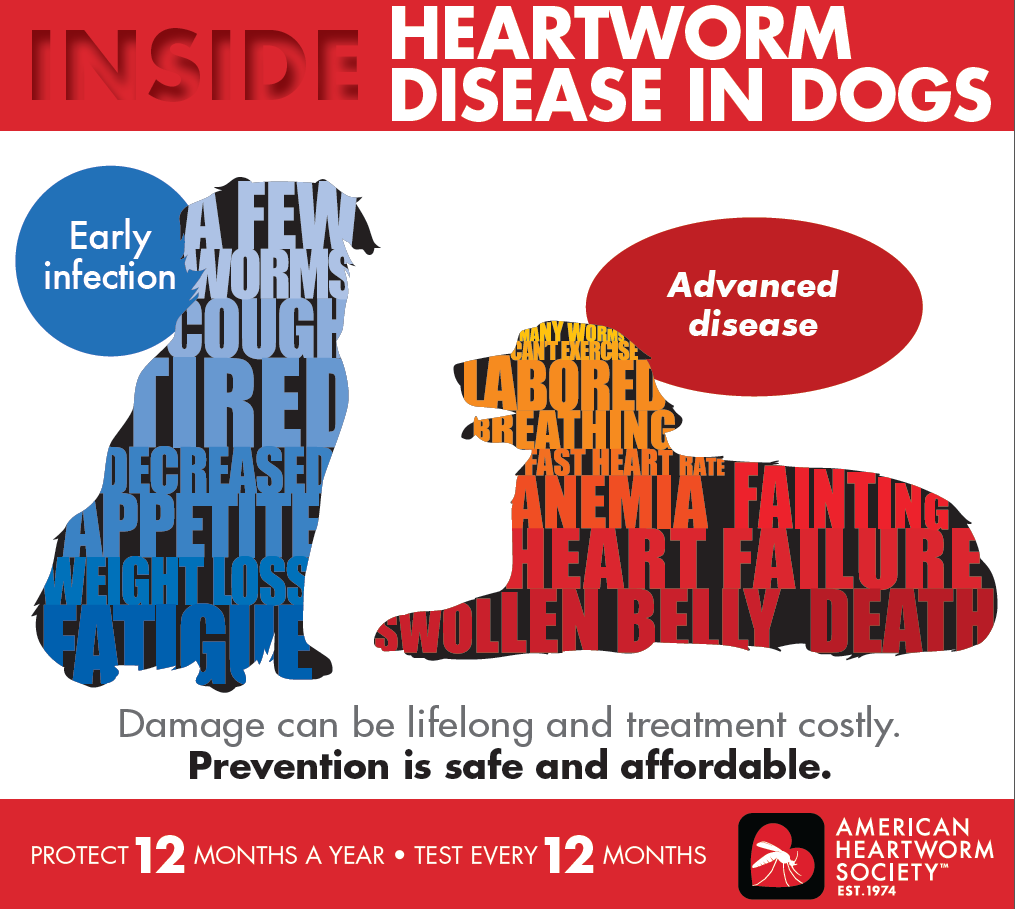Heartworm Basics
Heartworm disease is caused by a parasite called Microfilaria. This parasite is transmitted through mosquito bites. Once a mosquito takes a blood meal from an infected host, the infected mosquito can then transmit the parasite to other hosts such as dogs or cats when they take another blood meal. Heartworm disease manifests very differently in dogs compared to cats. In dogs, heartworms commonly reside within the heart and can grow to over a foot long. The parasites mature into adult worms causing irreversible heart, lung, and blood vessel damage. Clinical signs of heartworm disease in dogs can be quite vague and nonspecific including exercise intolerance, a mild cough, decreased appetite, collapse, respiratory distress, and/or weight loss. Dogs can also present with acute signs when the parasite burden in the heart becomes so great that it occludes blood flow within vessels causing a severe form of heartworm disease called caval syndrome. Cats, on the other hand, are not a normal host for heartworms. Whereas dogs can support hundreds of heartworms, cats typically only have 1-3 immature heartworms. Many cats with heartworm disease do not show any signs of infection; however, these parasites can cause a life-threatening condition called heartworm associated respiratory disease (HARD). Clinical signs in cats may include occasional vomiting, coughing, asthma-like attacks, collapse, and occasionally, sudden death.
Heartworm Detection
Routine heartworm antigen testing involves submitting a blood sample that is then tested for the presence of a protein secreted by adult female heartworms. Unfortunately, there are no currently available tests that can diagnose heartworm infection if only male heartworms are present. Depending on your pet’s history and potential for exposure, an additional test may be performed concurrently with the heartworm antigen test where a blood sample is scanned for circulating microfilaria.
Heartworm Testing for Dogs
Dogs under 7 months of age do not require heartworm testing as it takes 6 months after infection occurs for our currently available tests to be able to detect the antigen. Dogs 7 months of age and older who are not currently on heartworm preventative require a heartworm test prior to starting heartworm prevention medication to ensure there is not a pre-existing infection. Treating a dog with heartworm disease with a preventative can potentially lead to a pulmonary thromboembolism (clot in the lungs), which can be life-threatening, so pre-treatment screening is very important. Once a dog has a negative heartworm test, a monthly preventative can be started, and heartworm testing is then performed once a year as long as there are no missed doses. A heartworm test will also need to be performed if there is a missed dose of heartworm prevention.

Heartworm Testing for Cats
Heartworm detection in cats is more difficult than in dogs due to the low parasite burden and the fact that cats are not a typical host for heartworms. As such, immature heartworms do not usually mature into adults in cats so the adult heartworm antigen is not as prevalent as in dogs. Heartworm detection in cats typically involves performing the heartworm antigen test in conjunction with a heartworm antibody test to detect exposure to heartworm larvae. Additional diagnostic tests may include chest x-rays to assess the pulmonary blood vessels and size and shape of the heart or an ultrasound test to actually visualize the heartworms.

Heartworm Treatment
Heartworm treatment is lengthy, expensive, and can be dangerous due to complications associated with dying heartworms. As heartworms die, they can become dislodged from their site of infection causing clots to form within small blood vessels. Pets can even develop respiratory distress or even congestive heart failure due to complications created by dying heartworms. A key component that decreases adverse reactions to treatment of heartworm in infected pets is exercise restriction. Exercise and physical activity increases blood flow. The increased blood flow to occluded or partially occluded blood vessels increases blood pressure and can cause rupture of the vasculature and/or fibrosis. Numerous clinical studies have shown that exercise restriction not only decreases the progression of clinical signs in dogs with heartworm but also decreases the potential for resultant cardiovascular disease during treatment.
Heartworm Treatment for Dogs
Heartworm treatment for dogs is long and complex with the total treatment and follow up time requiring about 1 year. After a diagnosis of heartworm disease is confirmed, the treatment protocol begins with administering a dose of heartworm preventative and starting a 1-month course of steroids. Antibiotics are also started to treat bacteria called Wolbachia that reside within many heartworms. After 1 month of steroid and antibiotic treatment, another dose of heartworm preventative is given followed by a 1 month waiting period where no additional treatments are given. Dogs are then given their first dose of a medication called melarsomine. Melarsomine is an organic arsenic that kills adult heartworms and is the only FDA approved treatment for this parasite. This medication is given in conjunction with another 1-month course of steroids while continuing to restrict activity and administer monthly heartworm preventative. A second dose of melarsomine is then given 1 month after the first followed by a 3rd dose the following day. Dogs may or may not be kept in hospital for observation to ensure no adverse reactions occur. Oral steroids are continued along with monthly heartworm prevention. A blood sample is then taken and assessed for the presence of microfilaria 1 month after the 3rd dose of melarsomine while exercise activity continues to be restricted. If no microfilaria are detected, monthly heartworm prevention is continued and the heartworm antigen test is performed again 9 months after the last dose of melarsomine. Depending on how your dog tolerates the medications, additional hospitalization may be required for monitoring and supportive care. For dogs with severe heartworm disease, surgery is sometimes recommended to manually extract heartworms from the heart and/or venal cava.
Heartworm Treatment in Cats
Unfortunately, there is no FDA approved treatment for heartworm infection in cats and the drug melarsomine used to treat heartworm positive dogs is not safe to give to felines. The only treatment for cats with heartworm is supportive care, treating symptoms of cardiac disease, and monitoring. As you can see, the best and most cost-effective treatment for heartworm disease is prevention.
Heartworm Prevention
There are a variety of prescription heartworm preventatives available for both cats and dogs. Heartworm preventatives range in their duration of protection, parasites treated, and routes of administration, which include oral, topical, and injectable. Heartworm preventatives work by killing the immature larval stages of heartworm parasites but are not effective at eliminating adult heartworms. The inability of preventatives to treat adult heartworms is why it is so important that heartworm prevention be administered on a regular, monthly schedule. Regardless of the heartworm preventative used, this medication must be prescribed by a license veterinary professional.
Many OTC heartworm preventatives claim they are effective at preventing heartworms; however, many of these products do not have verified clinical data to support their effectiveness. These OTC heartworm preventatives often have the same active ingredient as prescription medications but more often than not, these active ingredients are not present in high enough concentrations to be effective.
Conclusion
Heartworm disease is a fatal condition that is difficult to treat. Fortunately, this disease can be prevented. If you have any questions about heartworm disease or preventative medications, please contact one of the veterinarians at Sam Bass Veterinary Wellness. We are here to help you better understand how to maintain a long, happy, healthy life for your pet!
